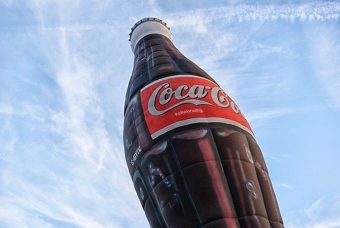
Coca-Cola has announced it supports testing a deposit return service for drinks cans and bottles, in a major coup for environment and anti-waste campaigners.
Executives told an event in Edinburgh on Tuesday evening they agreed with campaigners who were pressing the Scottish government to set up a bottle-return pilot scheme to cut waste and pollution and boost recycling.
They told the event, organised by Holyrood magazine, that the company had been examining the merits of a bottle and can deposit scheme, where consumers pay a small surcharge of about 10p per item, which is repaid when an empty can or bottle is returned to a retailer.
The company, the world’s largest soft drinks manufacturer, had previously resisted a deposit return scheme, which is used in countries such as Canada, Sweden, Australia and Norway. It had claimed in 2015 it did not reduce packaging use or improve recyclability.
But in a clear switch in policy, which mirrors its attempts to cut high sugar content in its products, a Coca-Cola executive told the event in Edinburgh its thinking had changed, in part because of experience in other countries.
“The time is right to trial new interventions such as a well-designed deposit scheme for drinks containers, starting in Scotland where conversations are under way,” he said.
The announcement was hailed as a “landmark moment” by the Association for the Protection of Rural Scotland (APRS), which is coordinating a lobbying campaign with other groups and businesses, including WWF and the Marine Conservation Society.
The Scottish parliament’s environment committee has set up a subgroup to examine the proposal, adding to pressure on Roseanna Cunningham, the Scottish environment secretary, to agree to a pilot scheme.
John Mayhew, APRS’s chief executive, said it was an extremely significant moment given Coca-Cola’s position as the world’s largest soft drinks manufacturer.
A poll by Survation for the APRS this month found that nearly 79% of Scots supported a return scheme, while only 8.5% opposed it.
“The momentum is now with the campaign,” Mayhew said. “The crucial next step is for ministers to design a system that works well for the public, for local authorities, and for small Scottish businesses, including retailers as well as producers. We know it can be done, and we will continue to argue for a deposit system which takes account of their needs.”
Political parties in Wales have also floated a deposit return scheme, with a suggested deposit of 10p a bottle. The Marine Conservation Society has said up to 17% of the rubbish found on beaches is drinks containers.
A Coca-Cola spokeswoman said the company’s polling had found majority support for a deposit return scheme across the UK. It said 63% of consumers backed the proposal and 51% of those polled believed it would increase their recycling.
The company said it had made significant progress on sustainability: its bottles and cans were 100% recyclable; packages were lighter and the amount of recycled plastic in its bottles would increase from 25% to 40% by 2020.
Even so, it accepted it needed to do more and had begun a substantial review of its sustainability strategies. “We are focused on our packaging, the role of our brands and the ways we can collaborate with others to improve recycling rates and reduce litter.
“Our sustainable packaging review is ongoing, but it’s already clear from our conversations with experts that the time is right to trial new interventions such as a well-designed deposit return scheme for drinks containers, starting in Scotland where conversations are under way.
“From our experience elsewhere in Europe, we know that deposit schemes can work if they are developed as part of an overall strategy on the circular economy, in collaboration with all industry stakeholders. We are open to exploring any well-thought-through initiative that has the potential to increase recycling and reduce litter.”
Richard Lochhead, the previous Scottish environment secretary, said he backed the scheme and believed Coca-Cola’s change of heart would influence other drinks manufacturers and the Scottish government to support the proposal. “This injects momentum and credibility into the debate in Scotland. We can lead the UK on this issue and this helps brings the introduction of such a transformative policy a big step closer,” he said.
Source: theguardian.com



